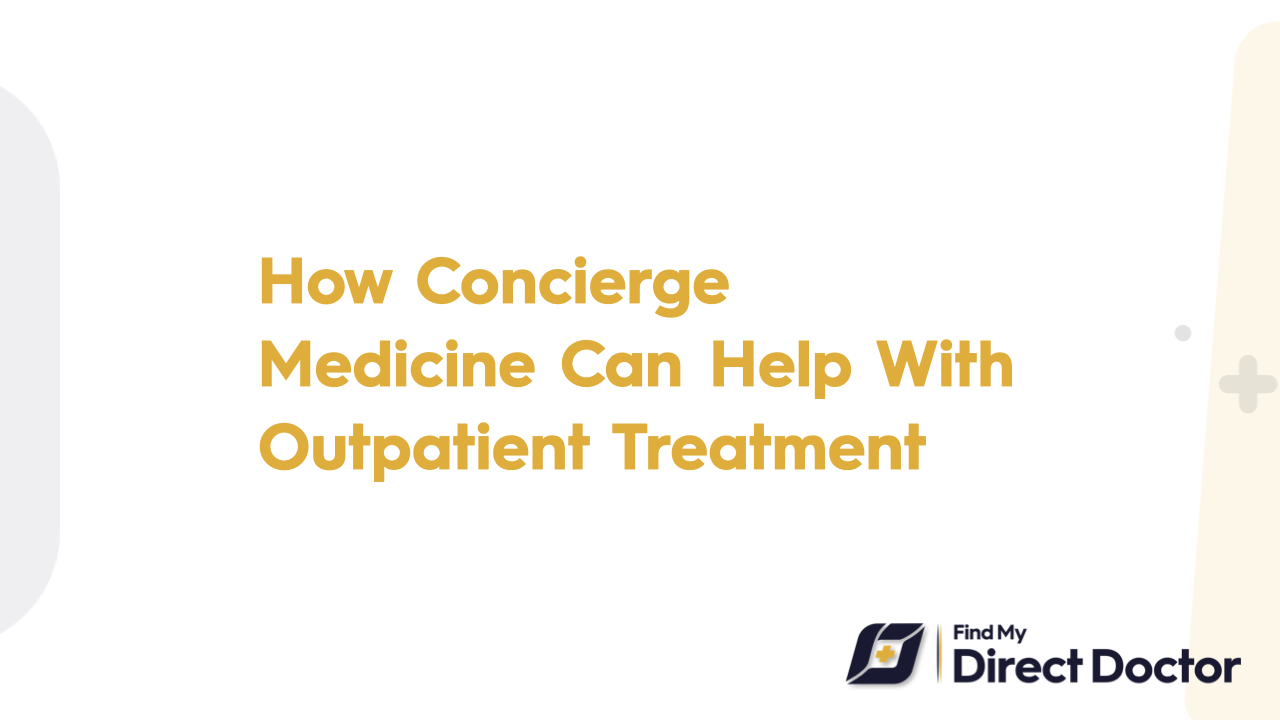



Inpatient treatment procedures allow patients to receive medical care without needing to stay in the hospital for a long period of time. It can be challenging to ensure that patients receive continuous, high-quality care throughout the process, even though this method allows them to recover in the comfort of their own homes. Concierge medicine bridges this gap by providing personalized, attentive, and seamless care from pre-procedure preparation to post-procedure recovery.

By providing a level of care that is beyond what is typically available in traditional healthcare settings, concierge medicine enhances the outpatient treatment experience. With concierge medicine, patients have direct access to their physician, who manages every aspect of the outpatient procedure. A one-on-one relationship allows the physician to better understand the patient's needs, allowing him or her to tailor the treatment plan accordingly.
Outpatient concierge medicine ensures that patients receive comprehensive follow-up care after their procedures and are well-prepared before their procedures. In order to relieve anxiety, the physician explains the procedure in detail, discusses any risks or complications, and answers any questions the patient may have. This makes the patient feel more confident.
In addition, concierge medicine provides continuity of care that is lacking in traditional outpatient settings. The physician monitors the patient's progress and adjusts the care plan as necessary after the procedure. By providing ongoing support, patients are less likely to develop complications and are more likely to succeed.
Personalized attention is one of the primary benefits of concierge medicine for outpatient treatment patients. In a traditional healthcare model, outpatient care may sometimes feel rushed or impersonal, with limited time for the patient to discuss concerns or ask questions. While concierge medicine emphasizes individualized care, patients are able to build strong relationships with their physicians and receive the attention they need.
Concierge medicine offers another significant benefit: its convenience and accessibility. Outpatient treatment can be demanding, especially if patients have to undergo frequent follow-ups or ongoing monitoring. Through concierge medicine, patients have direct access to their physicians, often through phone calls, texts, or video consultations. For outpatient procedures, this level of accessibility allows patients to receive timely advice and support without having to visit the clinic frequently.
Additionally, concierge medicine offers a more comprehensive approach to care. In addition to addressing medical issues, concierge physicians often incorporate holistic elements into the treatment plan as well. In addition to nutritional guidance, mental health support, and lifestyle modifications, all of these contribute to a more smooth recovery.
The privacy and discretion provided by concierge medicine are also essential benefits for many patients. No matter the outpatient procedure, some patients prefer a more private and personalized experience. With concierge medicine, patients receive care in a more comfortable and confidential environment, free from the stress and constraints of a busy medical office.
A concierge medicine practice excels at providing personalized care during the preparation and recovery phases of any outpatient treatment procedure. Prior to the procedure, the concierge physician conducts a thorough assessment of the patient's medical history, current health status, and any potential risks. In order to meet the patient's specific needs and goals, this information is used to create a customized care plan.
A concierge physician ensures that the patient is fully prepared for the procedure during the preparation phase. There may be detailed discussions about what to expect, pre-procedure tests, and guidance on how to prepare mentally and physically for the procedure. To ensure the patient feels confident and supported, the physician may also offer strategies to manage anxiety or discomfort.
Physicians closely monitor the patient's progress during the recovery phase, making any necessary adjustments to the patient's care plan as necessary. Regular follow-up visits or virtual check-ins allow the physician to address any concerns promptly, preventing complications and promoting a smooth recovery.
Concierge medicine includes access to a network of specialists and resources that can assist in the recovery process in addition to medical care. By coordinating physical therapy, mental health counseling, and nutritional support, concierge physicians ensure a holistic approach to recovery.
As part of concierge medicine, patients receive individualized care and support to prepare and recover from outpatient treatment procedures in a highly personalized and comprehensive manner. A concierge physician ensures that each patient receives the highest level of attention and expertise, from the initial consultation to the ongoing follow-up care. A concierge medicine approach focuses on the unique needs of each patient, resulting in better outcomes and a more positive experience.